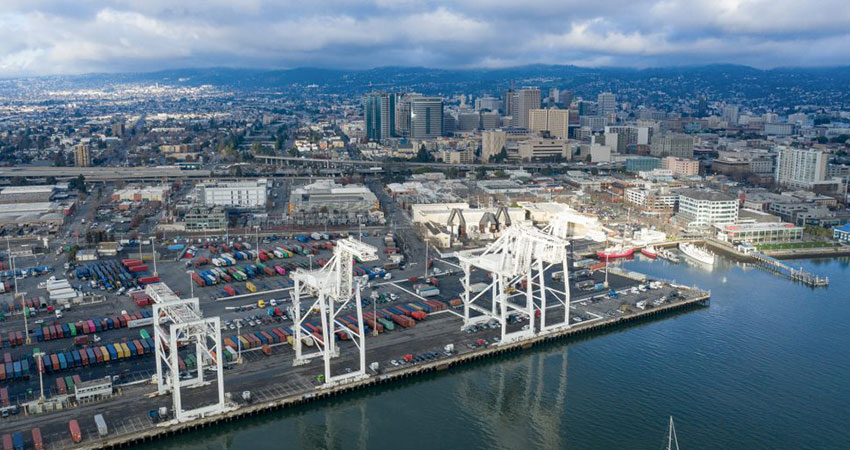Aerial view of the Howard Terminal at the Port of Oakland
While trucker protests are no longer blocking the flow of goods at the busy Port of Oakland, port officials are still hoping a California district court judge will take action to prevent future efforts to create a logjam there as retailers gear up for the 2022 peak holiday season.
Alameda County Superior Court Judge Delbert Gee on Monday did not grant a temporary restraining order that port officials had petitioned for, but is instead taking more time to weigh the issue, said Roberto Bernardo, communications director for the Port of Oakland.
“The port initiated legal action last week to stop truckers from blocking marine terminal gates and halting trade,” Bernardo said. “We requested a temporary restraining order and an injunction that prohibits those individuals, and any person who might be acting in concert with them, from illegal actions that stop the flow of commerce here at the port.”
A crowd of truckers protesting California’s AB5, which went into effect at the end of June after the U.S. Supreme Court refused to hear an appeal, swelled to over 1,000 during nearly a week of protests that blocked access to port terminals. Protests are still taking place, but the blockade at the terminal gate dispersed as of July 25.
AB5 requires companies operating in California to reclassify independent or gig workers as employees, affecting an estimated 70,000 truckers. Those protesting don’t want to lose the flexibility of their independent status, and many will likely leave the state, exacerbating an already bad driver shortage. Even companies from outside California must comply if they’re sending truckers there.
Bernardo said port officials recognize the trucker’s right to peacefully protest, and doesn’t want to suppress anyone’s First Amendment rights. They in fact set up “free speech zones” within the port, which some protestors are still taking advantage of.
“But our bottom line is, we can’t have an illegal action that is in effect halting international trade,” he said. “Now we’re dealing with weeks and weeks of backlog caused by that disruption. And that’s on top of the supply chain congestion not just Oakland but the west coast and the entire world is already experiencing.”
Bernardo did agree that an earlier flow of traffic into the port for both back to school and holiday volume, in late spring and early summer, may have somewhat softened the blow of the Oakland protest.

